________________
30
VIJAY PANDYA
SAMBODHI
It is not certain whether Rudrata had Lollaţa before him whom he was following in time or he had an independent line of thinking. Abhinava refers to Lollata having the similar view. But as there is no concrete endence of Rudrata following Lollata, it can be stated that Rudrata is here making some extraordinary statements significance of which continues to be unfolded by his succeeding literary critics.
So by adding one more rasa, Rudrata has inaugurated an altogether new world of rasas which continued to have many rasas like Laulya Rasa (referred to by Abhinava) Mrgyā Rasa, Aksa Rasa (referred to by Dhananjaya).
From the stance taken by Rudrata, it can also be stated that bhāvas can be developed into rasas and hence vyabhicāribhāvas also can be rasas. So it comes to this that sthāyins and vyabhicārins are not some fixed sets but they are names of stages. A sthāyin can be a vyabhicārin and a vyabhicārin can be a sthāyin. This is something revolutionary in the field of literary criticism. As we know, further in time, it was Bhoja who held a similar view like that of Rudrata. Bhoja also accepts the preyān rasa, first mentioned by Rudrata, of course, with an enlarged connotation. Along with Preyān, Bhoja added two more rasas viz Udātta and Uddhata.
Bhoja like Rudrata held that all the bhāvas are capable of being rasas. In all Bhoja said that all forty-nine (eight sthāyin, 33 vyabhicārin and eight sāttvika bhāva) bhavas can attain the position of rasa. We know that later on in the history of Sanskrit poetics, different rasas like bhakti-rasa (enunciated by Madhusudana Saraswati) māyā-rasa. kārpanya rasa (referred to by Bhānudatta), krīdanaka rasa (of a Jaina work) are referred to. So it appears that, there can never be an end to it.
Where can this situation lead to ? Uitimately in the field of literary criticism, this will lead to anarchy and chaos and hence, long back Abhinava had to cry a halt to this acitity of increasing rasas infinitum.
But the credit must go to Rudrata for keeping the to-be-stagnant waters ever-flowing in the field of Sanskrit literary criticism.
There lies Rudrata's most valuable and original contribution to the rasathought.




